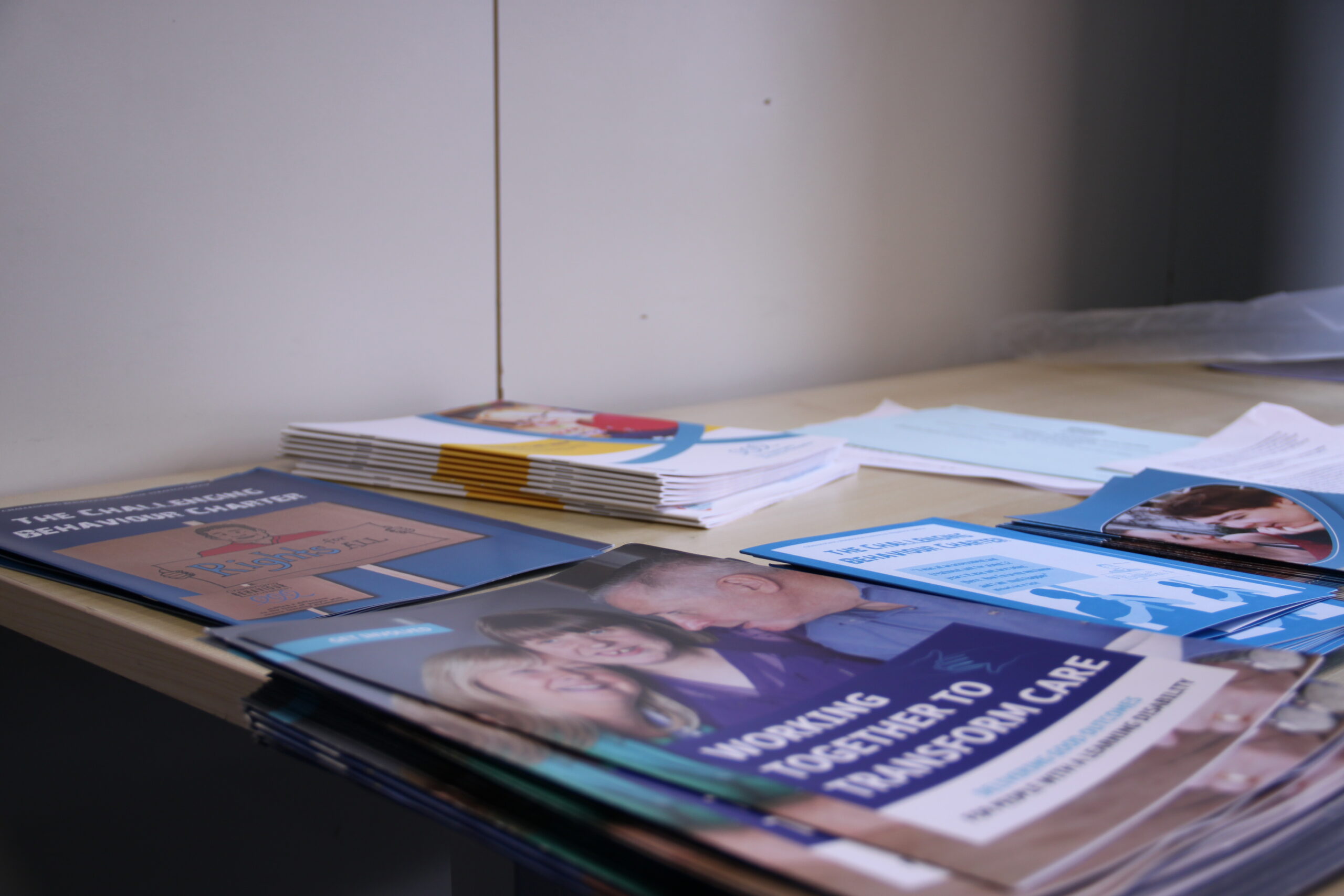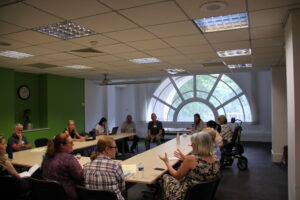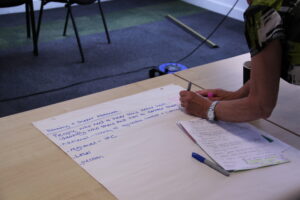
Co-Producing a Lifelong Action Plan
We need an action plan that will make a positive difference to the lives of people with a learning disability and ensure that they get the right support, in the right place, at the right time.

Here you can read a summary of our June 2023 national meeting, held in-person and online, with links to posters, resources, and other related content
You can read the write-up of the November 2022 meeting here
The meeting started with an introductory presentation, setting out the aims of the meeting: to co-produce actions that can be included in an action plan, co-produced by people with a learning disability, their families, and people who support and work with them, to ensure that people with a learning disability are able to get the support that they need, in the right place, at the right time, so that they can live good lives.
We then watched a film, ‘What makes a good life?’, produced by members of the SeeAbility Engagement Team and people supported by Choice Support and Achieve Together. In the video, eleven people shared their experiences and thoughts on what helps them to have a good life, the barriers that get in the way, and what actions should be taken.
We also watched another film, ‘Looking back, looking forward’, in which two family carers described their experiences trying to get the right support for their son, who is non-verbal and requires skilled support. They shared a lifelong approach, advocating the course of their relative’s life. They described their experiences in the past and how things are now, what will be needed in the future when they can no longer provide input and support and reflected on the things that have (and haven’t) changed, including what they would have liked to know when their son was very young, and what they think was, and is, needed.
Cally Ward then gave a presentation, ‘Plugging away as the gaps get wider’, focusing on the experiences of growing older with a learning disability and as a family carer, and on the actions that need to be taken.
Four of the workshops at the CB-NSG focused on key themes drawn out from the work done so far on co-producing an action plan:
These workshops were split into two halves. During the morning, attendees looked at the ideas and actions that had previously identified as necessary, and worked to identify which could be achieved in the short term and how this could be done. During the afternoon session, they examined one or two of the other proposed actions in depth and broke these down into short, medium, and long-term actions, with accountability and timescales.

Attendees in the ‘early intervention’ workshop
A fifth workshop looked in depth at the Getting it Right project, a three-year project which ran from 2019 to 2022. This workshop brought together representatives from each of the three areas that participated in the project, CBF staff, the project’s independent evaluator, and other CB-NSG attendees. The group identified cross-cutting themes, factors which enabled success and barriers to achieving goals, and how the learning from this project could be taken forward by the areas involved in the project, and by other areas. Attendees also identified how the learning from this project, and from others that attendees were involved in, could be incorporated into the lifelong action plan.
The posters displayed during the CB-NSG each reflected one or more of the core themes of the co-produced, lifelong action plan. You can read about these posters below, and view any available online versions.
Good Lives Framework – This poster by Learning Disability England provides information about Good Lives, a framework based on self-advocate priorities and built on the evidence and experiences of people with a learning disability, their families, and paid supporters.
Deprescribing Psychotropic Medicines in People with Intellectual Disabilities – Danielle Adams, a PhD student at the University of Warwick, presented the findings of a systematic review that explores the effects of deprescribing psychotropic medicines in individuals with learning disabilities who display challenging behaviours.
You can read more about medication, including inappropriate medication, below:
The use of medication for challenging behaviour
Changing poor practice: medication
Early Positive Approaches to Support (E-PAtS) – This poster by Dr Emma Johnston and Hannah Newton shows how Cardiff and the Vale have implemented the E-PAtS programme, and the benefits that it has had.
You can read more about E-PAtS below:
CBF: Early positive approaches to support
Is teaching key skills in local schools an important element in supporting young people to live without behaviour that challenges?– Heather Armstrong and Vickie Leahy presented a poster showing how a school in London for children with a moderate learning disability’s work with a CAMHS Learning Disability team found that teaching ‘key skills’ may help to reduce challenging behaviour and improve quality of life of children with a learning disability and their families.
Supporting young people with a diagnosis of Intellectual Disability or Autism at high risk of inpatient admission – Early Outcomes from the National and Specialist CAMHS Autism and Intellectual Disabilities Intensive Intervention Team (AID-IIT) – This poster by Emma Jewitt, Dr Dominic Wrein and Dr Catherine Sholl shows how the National and Specialist CAMHS Autism and Intellectual Disabilities Intensive Intervention Team, a multi-disciplinary team, has helped prevent admissions to inpatient settings.

You can find the actions from the CB-NSG workshops here. This is part of the CB-NSG’s work to coordinate a lifelong action plan, co-produced by people with a learning disability, their families, and people and organisations that support and work alongside them. These actions will be updated as they are progressed.
If you’re interested in being a part of co-producing and delivering this plan, please email actionplan@thecbf.org.uk

We need an action plan that will make a positive difference to the lives of people with a learning disability and ensure that they get the right support, in the right place, at the right time.

The CBF's 'Getting It Right' project helps improve both national and local support and services for children and adults with severe learning disabilities and their families.